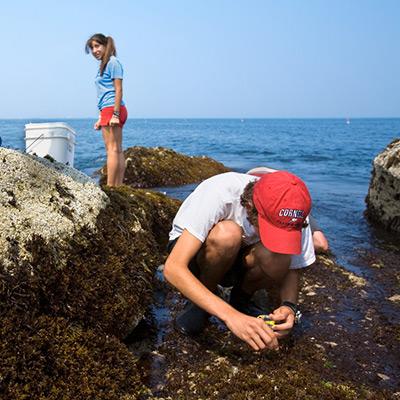As a biological sciences major, you’ll have novel opportunities to jump into engaging research projects. With more than 300 faculty, our undergraduate program, jointly run by the College of Arts & Sciences and the College of Agriculture and Life Sciences, is one of the most highly regarded in the country. You can choose a concentration from multiple areas, including animal physiology; biochemistry; computational biology; ecology and evolutionary biology; general biology; genetics, genomics and development; human nutrition; insect biology; marine biology; microbiology; molecular and cell biology; neurobiology and behavior (neuroscience); plant biology; and systematics and biotic diversity.
Requirements
Sample classes
- Human Microbes and Health
- Marine Ecosystem Sustainability
- Hormones and Behavior
- Stem Cell Biology
Outcomes
All information below is based on the 2022 First-Destination Survey. Lists are not exhaustive; rather, they are a sampling of the data. If you would like more information, please email as_careers@cornell.edu
What can you do with a degree in Biological Sciences?
Graduate school:
In 2022, 32% of biological science majors embarked on graduate school journeys. They pursued various advanced degrees, with 32% focusing on their PhD, 26% working towards an MD, 8% dedicated to an MPH, and more. Their graduate field interest ranges from Medicine (29%) to Neuroscience/Neurobiology (11%) and Biochemistry, Molecular & Cell Biology (8%).
These ambitious individuals have chosen to continue their education at prestigious institutions like Duke University, Harvard University, the Massachusetts Institute of Technology, Columbia University, and the California Institute of Technology.
Employment:
87% of biological science majors take a gap year before graduate school. During this period, 64% secured employment, and the majority entered sectors in human healthcare services (36%) and education (33%). Weill Cornell Medicine, the National Institute of Health, Massachusetts General Hospital, and the Dana-Farber Cancer Institute were the top 2022 employers.
Where 2022 Biological Sciences Graduates Work
| Employer | Job Titles |
|---|---|
| Boston Children’s Hospital | Anesthesia Technician |
| Clearview Healthcare Partners | Healthcare Consulting Analyst |
| Columbia University Medical Center | Lab Technician |
| Cornell University | Lab Technician |
| Dana-Farber Cancer Institute | Computational Biologist |
| Healthcare Legal Solutions, LLC | Healthcare Paralegal |
| Kuchnir Dermatology and Dermatologic Surgery | Medical Assistant |
| Massachusetts General Hospital | Clinical Research Associate |
| New York Proton Center | Researcher and Nursing Coordinator |
| Verve Therapeutics, Inc. | Research Associate |
| Weill Cornell Medicine | Bioinformatics Analyst |
| Wilderness Medical Associates | Assistant Wilderness Medicine Instructor |
